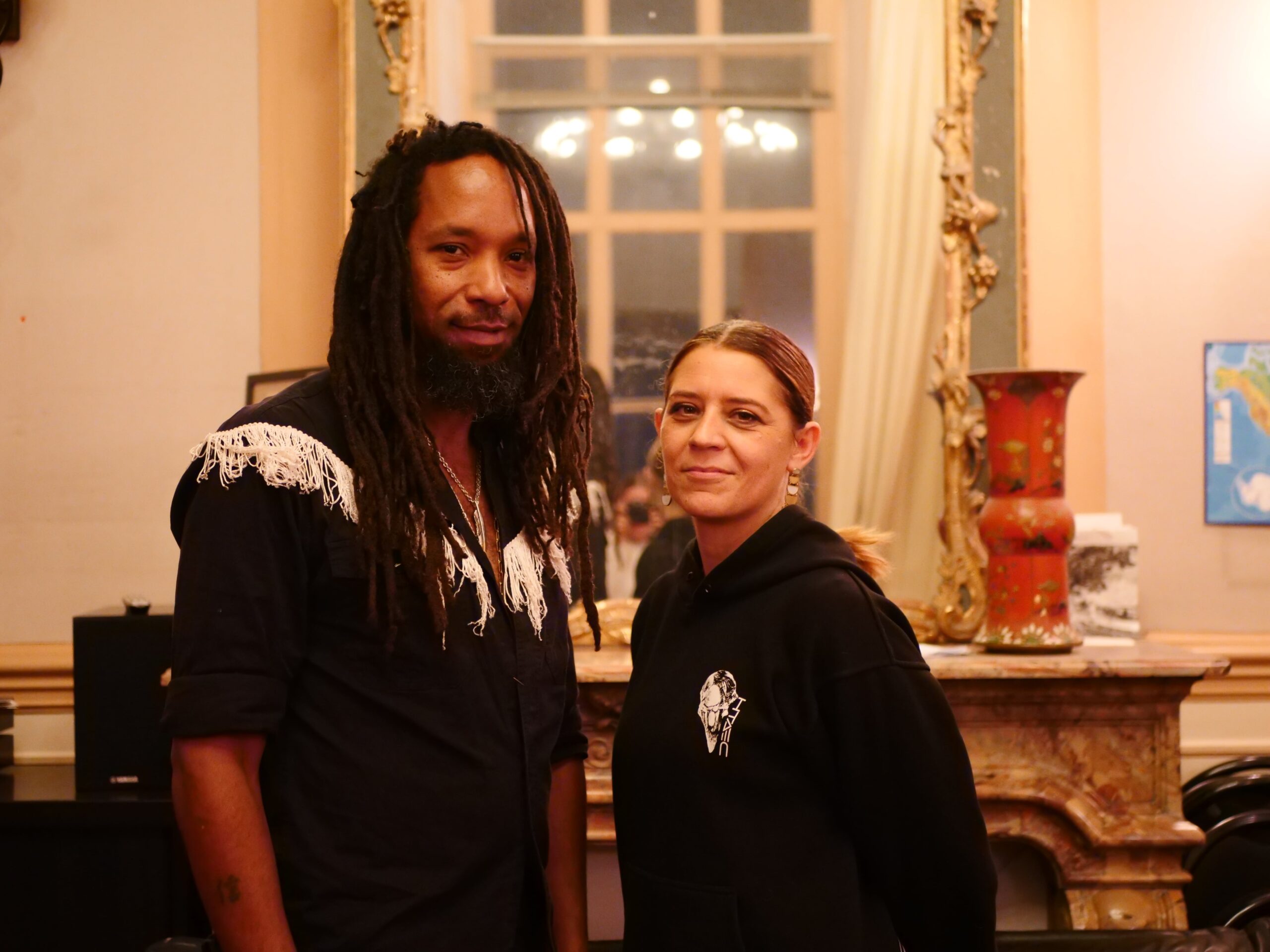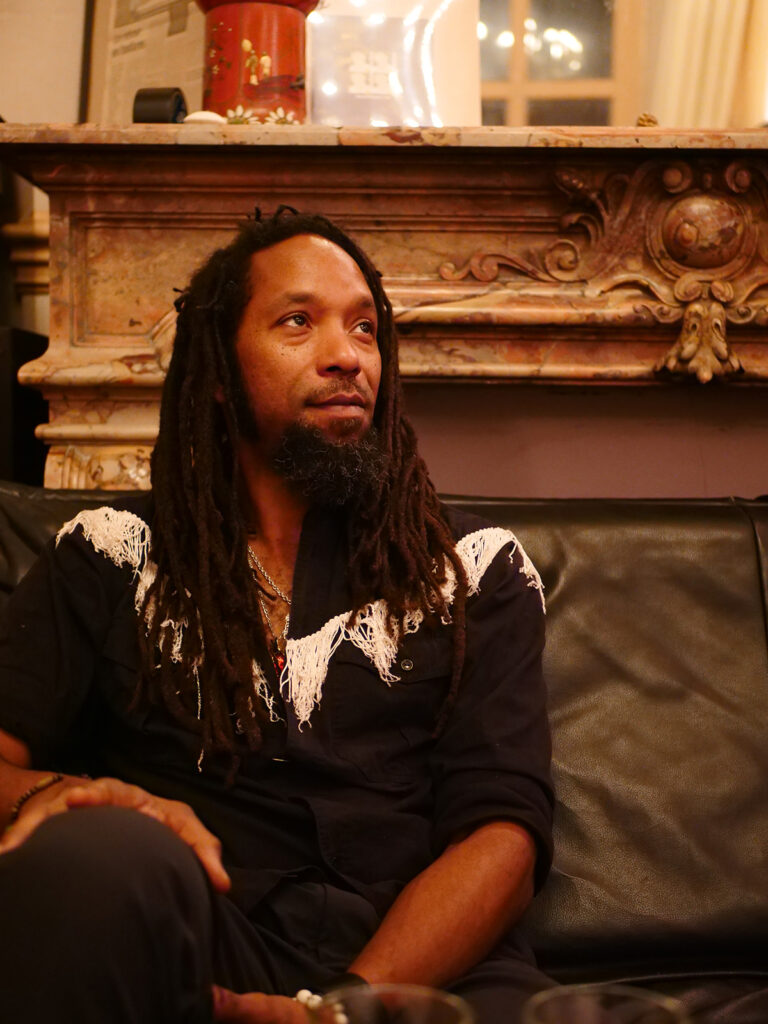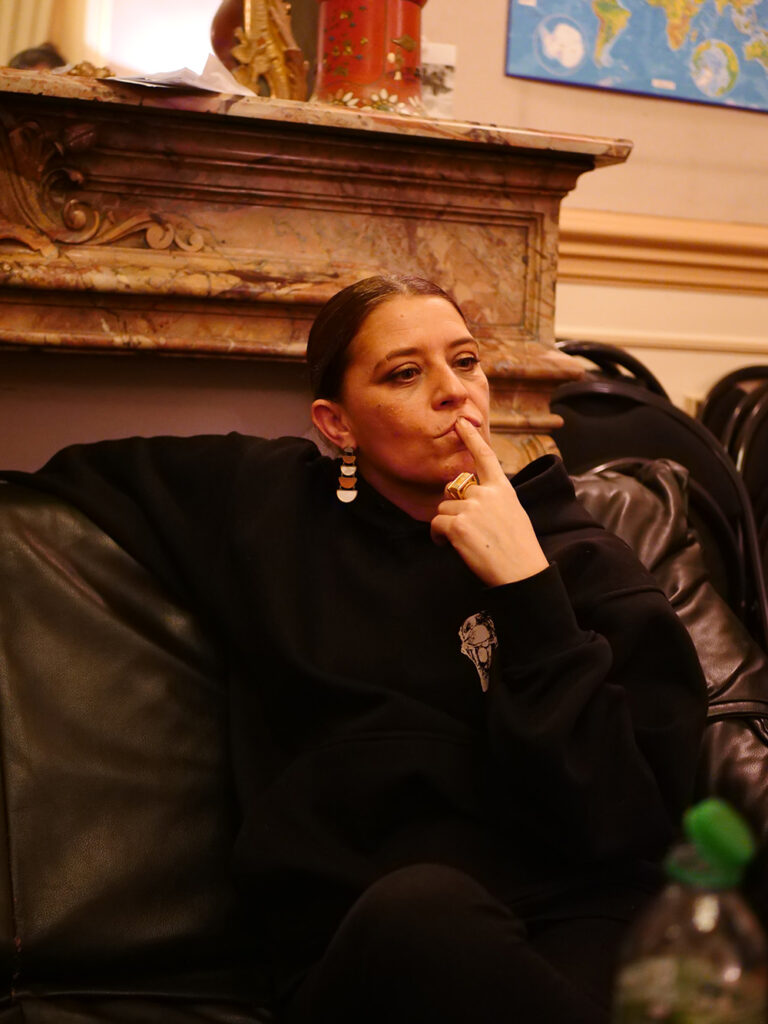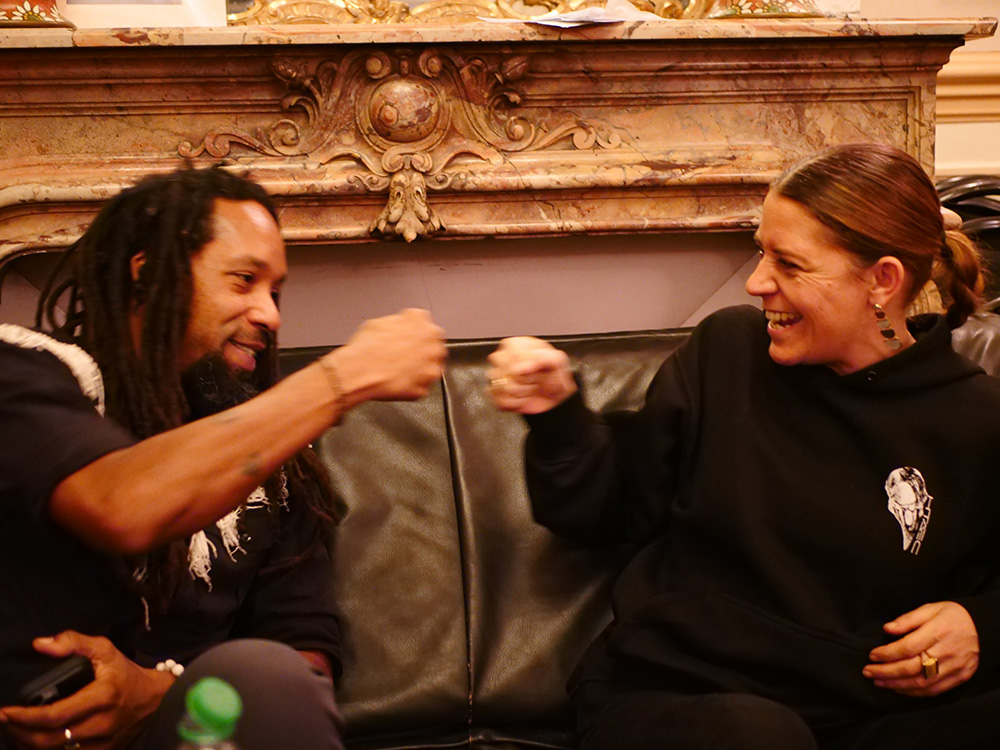Transatlantic Connection: Transcending Borders, Improvising Harmony

© C.Prat
He is an American saxophonist who has developed a method of transmitting improvisation that is shaking up the Atlanta music scene. She is a music lover, French, and director of A.M.I (Aide aux Musiques Innovatrices), an association that hosts artists in residence and organizes two festivals that are well known to Marseilles audiences.
Kebbi Williams and Élodie Le Breut met as part of the City/Cité program run by Villa Albertine in partnership with Friche la Belle de Mai. Together, they are trying to imagine how to develop popular, multi-cultural music, rooted in the communities that sustain it, whether in Marseille or Atlanta.
Can you introduce yourself?
Kebbi Williams: I’m from Atlanta, Georgia, I play saxophone. I started out playing music when I was ten. My father’s a musician, my uncle is also, he was in a famous group in America called the Commodores. So, I’ve been hearing music all my life, but my dad was like, don’t, be a doctor, be a lawyer. Actually, I wasn’t serious about it at first. But then, one summer right before high school, I went to a music camp. When I first tried to take a solo, I was just like, “oh”. Maybe it wasn’t that good, but I thought it was good at that time. That was when I decided to be a musician. I went to New York after college, because that’s where everybody is supposed to go to learn jazz. But then, I went crazy and rejected everything. I felt restricted, with the rules and all, and I came back to Atlanta, where I discovered the power of improvisation. I was doing this. But I was a starving artist, I wasn’t making $1 million in the rich neighborhood. I got to be in my neighborhood and see the people of this neighborhood, people who were homeless, people who were drug addicts… And I was near homeless as well. Then, I got a sense of community, my community, and I started helping the community and being politically active. I realized it was tough for a lot of artists to get a gig at a venue, that’s why I started Music in the Park. At first, I didn’t have youth in mind. I got a grant from the City of Atlanta, Cultural Affairs, and I decided to take the money and pay a lot of people with a little bit of money. I wanted to use the Atlanta Symphony Orchestra, but I couldn’t afford it. So, I chose students. My intention wasn’t at first even to help them. I was just thinking: artists. And we needed some people to play symphonic instruments. And so, we got kids. It was such a good experience for everyone because the kids were sitting next to the pros, they were like, “Oh my God”, they were learning from us. And the pros were sitting next to the kids. It touched their hearts. Then, not only the youth artists and the pros were affected, but the people in the community, because it was in the streets, and in these communities, there was no music outside usually.
Élodie Le Breut : I am director of AMI, an organization based at Friche la Belle de Mai since 1994. We are supported by various local authorities in our efforts to develop a set of specifications for the support of musician-artists. We have six studios at the Friche, we help around fifteen project leaders a year to set up their structures, and we have seventy groups in residence a year, from local to international. We also organize two events: Hip-Hop Society, devoted to hip-hop culture in all its forms, and Jamais d’Eux Sans Toi, dedicated to experimental cultures and music. These two events are a showcase for what goes on all year round and is invisible to the public.


How did you meet?
Kebbi Williams: I met Elodie at my gallery, called Gallery 992, we have art and music and lots of activities there. We had a good time in Atlanta, good meeting. She was lucky to see our festival. And, after that, I got to come here in Marseille to see hers. It’s been fantastic. All these different scenes, it’s so different from Atlanta. It was great for me to just see something so different. And, I’m still exploring.
Élodie Le Breut : I’ve been to Atlanta twice. Once as part of a group visit in October 2022, organized by City/Cité, where I met Kebbi at Gallery 992. But I hadn’t seen the festival, so I had to come back! I went back this year because we’re accompanying an artist who’s a Villa Albertine laureate in 2023, Djellali El Ouzeri, who’s a key player in hip-hop culture in Marseille, notably because he’s the founder of the Fonky Family, but also because he works a lot with us on transmission issues vis-à-vis young groups.
During my second stay in Atlanta, one of my missions was to see the Music in the Park festival; I’d heard a lot about it, and what interested me was to see how it was run. There’s a principle that Jamais d’Eux Sans Toi and Music in the Park have in common: these festivals highlight the invisible in all its aesthetic forms. And although Kebbi’s work is primarily focused on improvisation, avant-garde and experimental music, he also works with young people, notably through a magnificent parade of drumlines and work with schools. I was also interested to see a festival set up in the street, on people’s front porches. It’s all free, and I saw similarities with what we were trying to do.
Are there any echoes between Marseille and Atlanta regarding cultural and musical dynamics?
Kebbi Williams: There’s a slight echo, but the cultures are different. I think it’s a necessity for us to connect, precisely because the cultures are different. Here in Marseille, there are many different cultures, many different countries implied. In Atlanta, it’s not as much as in here. Atlanta is a hub in the United States, it’s one of the biggest in the south, but the south of the United States is not like New York, Chicago, L.A, or Miami. It’s a lot more homogenous, there are blacks, whites, Mexicans, but it’s not as multicultural as in Marseille. I think it’s very important for us to see the different approaches, the way arts are approached here. The black culture in Atlanta is strong. And I see a strong African culture here, too. I felt kinship when I went to the festival, it was so great because there were so many different gigs. For instance, there was a Congo band, and it felt natural. A lot of us, the blacks, in America, don’t know where we came from anyway, because of slavery. Any of us could be from the Congo, but we don’t even know. I think it’s important for the large amount of blacks in particular over there to see other cultures that may resonate with them. Of course, Atlanta took over the rap scene, everybody knows that, but there’s other special things as well in Atlanta that the world does not know about for sure. I think it would be good to expose my side as well, and it would be great to connect the two cities and showcase what’s being done on both sides.
Élodie Le Breut : There’s an echo because these are two secondary cities with a strong identity. Atlanta, with its strong marketing around hip-hop, and Marseille as the second city or maybe even the first city for rap in France.
I can also see a parallel between the still vivid traces of slavery in Atlanta and colonization in Marseille. It’s a history that’s specific to France, but in Marseille, it’s centuries old, it hasn’t been erased from one history to another. All the layers of France’s relationship with the African continent are still very visible, and continue beyond colonial history.
I think there’s also a historical link between the two cities, even if it’s difficult to compare them. As far as hip-hop is concerned, Atlanta has set itself apart with its aesthetic, notably with the advent of the hip-hop group Outkast, in which, incidentally, Kebbi played. Marseille, on the other hand, also stood out for its different approach to rap. But from both points of view, it’s interesting to see that this was done with the desire to do something different. When you see Andre 3000 (from the group Outkast) releasing a flute album (New Blue Sun, out November 17, 2023), that’s what he’s building: creativity, constant experimentation. This is also what I was looking for in inviting Kebbi to Marseille: to enable him to pass on his specific way of making music, this variable-geometry form he invented and which is an improvisation space that takes place every Sunday in Gallery 992. In addition to the concerts, he also gave a masterclass at the Marseille Conservatory.
Can you tell us a bit more about REVERENCE?
Kebbi Williams: Reverence is what we do every week on Sundays in the past seven years, since I got the gallery the first time. We created this place just in front of the park where the festival takes place, so that we could have a more lasting impact on the community. We give music lessons, there’s art on the walls. And every Sunday we do an exposition of improvisation – I don’t know if this is the right word. These are jam sessions, and one of the rules is no covers, no requests. The point of it is to create music, there and at that moment, and it’s beautiful. The guys we have with us are all in tune with it, because every moment has a different sound, every Sunday has a different feeling. Today is not yesterday. To have the parameters of not premeditated anything is a new way of trying to make music, and that’s scary, but if you really focus on making it great and being in tune with the people around you, you can really make great sounds. Not to be pompous, we create masterpieces, and we do it with this new approach. Improvisation is not a new concept, it’s everywhere in life, but here, the idea is to make music out of scratch with no preparation. It’s a new way of making music.
Élodie Le Breut : I enjoyed attending REVERENCE, and that’s another reason why Kebbi is in Marseille. These improvised musical forms are very difficult to see, because they are rarely, if ever, broadcast. As he says, to program this kind of proposal in France is to take a risk. Few programmers are willing to do it. It’s still based too much on notoriety, particularly that of Kebbi, but I think that the whole musical creation is going to have to ask itself how music is going to evolve. These forms are the music of the future. All the artists in REVERENCE are not from the same generation, they don’t listen to the same music, they don’t have the same aesthetic background, but the fact of being together and improvising together in total freedom creates something really special. It’s a laboratory.

You’ve talked a lot about making music for the community. The word “community”, often used in the United States, is less prevalent in France due to its negative connotation stemming from its political usage. So, making music for the community, what does it mean for you?
Kebbi Williams: In this neighborhood we were in, there was no variety of arts, that’s why the community was affected by Music in the Park. The only thing that you would hear coming out of people’s cars is rap – or maybe, some reggae or pop. And when you go to the rich neighborhood, there, you can have people playing symphonies in the park. Then, in this neighborhood I was in, the people had never heard what we were going to do. In the park where we organized Music in the Park, the kids used to play basketball at the court and do all kind of devious things, like selling drugs. The first time I organized a gig, something special happened. The kids were uplifted by the pros, the pros were uplifted the kids; the young kids who like selling drugs and doing bad stuff got to see kids who were doing positive stuff, and they enjoyed it. A homeless woman come up to me crying, saying she never heard anything like that before. After that point, I was like: I got to do it again. The community wants to do it again. So, we did it for a few years in the park, we partnered with larger organizations, and then we would close down the street to perform gigs there. And then, one day, Gallery 992 was opened right directly across the street, for the community. When I think about community, I just think about the common man who work every day. When I talk about community, I talk about my neighborhood.
Élodie Le Breut : The question of communities has a negative appraisal in France for reasons of political language, but I like to use this word in relation to the community of people we touch through our action, particularly the artists who come for residencies. Kebbi, now you’re part of our community!
Then, what we might call community, in our case, is the neighborhood, it’s proximity… At La Friche, we’re constantly trying to strengthen the relationship with the territory. Community is proximity, it’s about ensuring that artistic proposals and the practice of art are accessible to as many people as possible, especially those close to us. A.M.I. and La Friche could very well be part of Gallery 992‘s approach, but it’s true that in Atlanta it’s even stronger because there’s no significant public funding. As a result, there’s a self-management and solidarity that, for us, is perhaps less organic.
